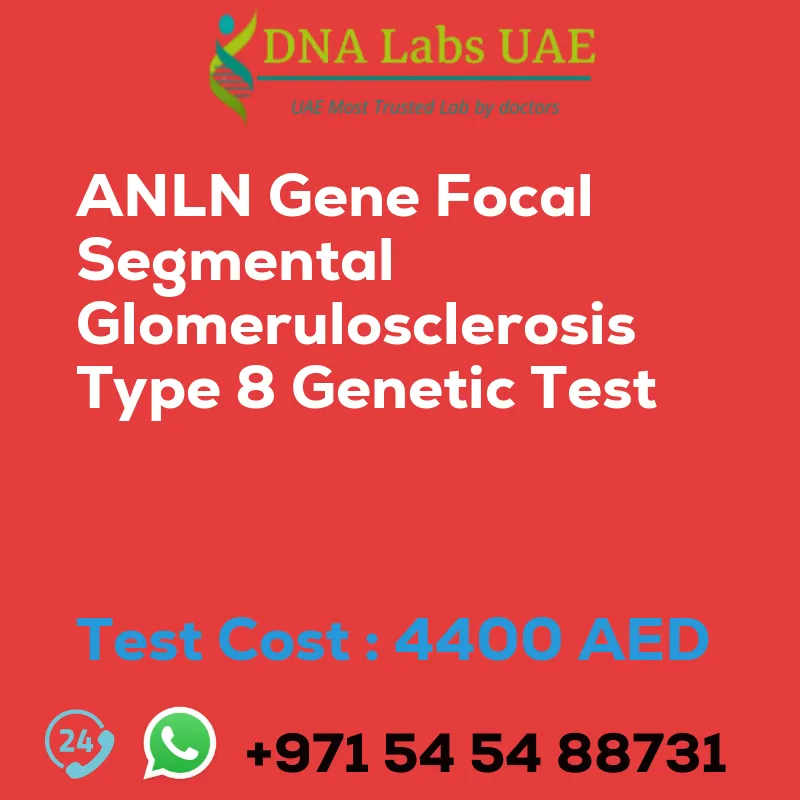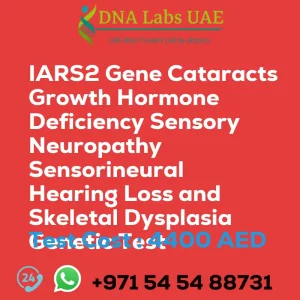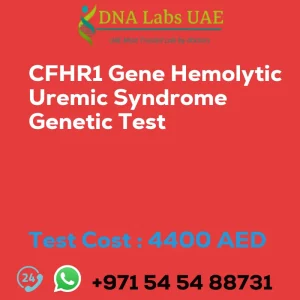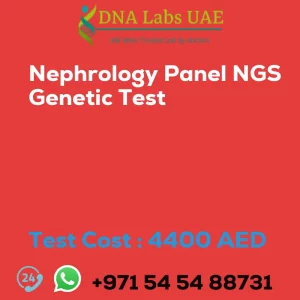ANLN Gene Focal segmental glomerulosclerosis type 8 Genetic Test
At DNA Labs UAE, we offer the ANLN Gene Focal segmental glomerulosclerosis type 8 Genetic Test. This test is designed to diagnose and identify genetic variations associated with Focal Segmental Glomerulosclerosis (FSGS) type 8, a rare genetic disorder that affects the kidneys.
Test Components and Price
The ANLN Gene Focal segmental glomerulosclerosis type 8 Genetic Test is priced at 4400.0 AED. The test requires a blood sample, extracted DNA, or one drop of blood on an FTA card.
Report Delivery and Method
After the sample is collected, the report will be delivered within 3 to 4 weeks. The test utilizes NGS (Next-Generation Sequencing) technology to analyze the DNA sequence and identify any genetic variations or mutations associated with FSGS type 8.
Test Type and Doctor
The ANLN Gene Focal segmental glomerulosclerosis type 8 Genetic Test falls under the category of Hepatology, Nephrology, and Endocrinology Disorders. It is recommended to consult with a General Physician for this test.
Test Department and Pre Test Information
This test is conducted in the Genetics department. Before taking the test, it is essential to provide the clinical history of the patient who is going for the ANLN Gene Focal segmental glomerulosclerosis type 8 NGS Genetic DNA Test. A Genetic Counselling session will be conducted to draw a pedigree chart of family members affected by the ANLN Gene.
About FSGS Type 8 and NGS Genetic Testing
Focal Segmental Glomerulosclerosis (FSGS) type 8 is a condition characterized by scarring and damage to the glomeruli, the tiny blood vessels in the kidneys responsible for filtering waste and excess fluid from the blood. The ANLN gene is associated with this condition.
NGS (Next-Generation Sequencing) genetic testing is a method used to analyze a person’s DNA sequence and identify genetic variations or mutations associated with specific conditions. In the case of FSGS type 8, NGS genetic testing can identify mutations or variations in the ANLN gene that may contribute to the development of the condition.
By identifying these genetic variations, healthcare providers can make an accurate diagnosis of FSGS type 8 and provide appropriate treatment and management strategies. NGS genetic testing also plays a crucial role in genetic counseling and family planning, as it helps determine the risk of passing on the condition to future generations.
| Test Name | ANLN Gene Focal segmental glomerulosclerosis type 8 Genetic Test |
|---|---|
| Components | |
| Price | 4400.0 AED |
| Sample Condition | Blood or Extracted DNA or One drop Blood on FTA Card |
| Report Delivery | 3 to 4 Weeks |
| Method | NGS Technology |
| Test type | Hepatology Nephrology Endocrinology Disorders |
| Doctor | General Physician |
| Test Department: | Genetics |
| Pre Test Information | Clinical History of Patient who is going for ANLN Gene Focal segmental glomerulosclerosis type 8 NGS Genetic DNA Test. A Genetic Counselling session to draw a pedigree chart of family members affected with ANLN Gene Focal segmental glomerulosclerosis type 8 NGS Genetic DNA Test gene ANLN |
| Test Details |
The ANLN gene is associated with Focal Segmental Glomerulosclerosis (FSGS) type 8, which is a rare genetic disorder that affects the kidneys. FSGS is a condition characterized by scarring and damage to the glomeruli, which are the tiny blood vessels in the kidneys responsible for filtering waste and excess fluid from the blood. NGS (Next-Generation Sequencing) genetic testing is a method used to analyze a person’s DNA sequence and identify any genetic variations or mutations that may be associated with a particular condition. In the case of FSGS type 8, NGS genetic testing can be used to identify mutations or variations in the ANLN gene that may be responsible for the development of the condition. By identifying these genetic variations, healthcare providers can make an accurate diagnosis of FSGS type 8 and provide appropriate treatment and management strategies for affected individuals. NGS genetic testing can also be used for genetic counseling and family planning purposes, as it can help determine the risk of passing on the condition to future generations. |








